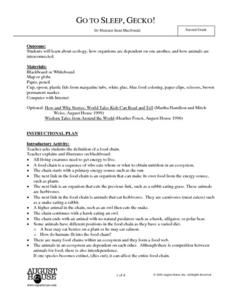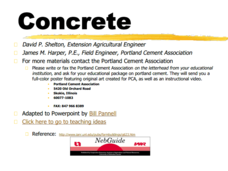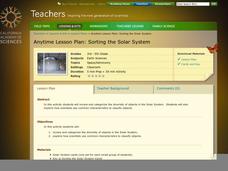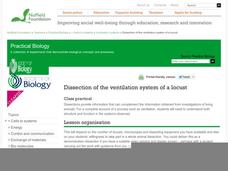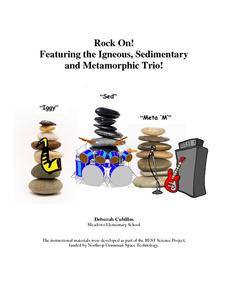Curated OER
Where It Comes From: All About Heredity
Characteristics are not only inherited, but can be acquired through interactions with the environment.
Curated OER
Structure and Function of the Cell/Introduction to the Cell
So, this is not technically a learning exercise, but rather a chapter of reading material, pictures, and diagrams introducing young biologists to the cell. Cell theory, diversity, size, and shape are described. The internal organization...
Curated OER
What Are Homophones?
A fun learning exercise for homework, a warm-up, or a substitute day! Learners choose the correct word out of a set of homophones, such as made/maid and pale/pail, based on context clues in each sentence. There are twenty-two questions...
Curated OER
Drugs and Safety Precautions
Drugs can both help and harm depending on how they are used. Fifth graders complete a worksheet that provides background information on prescription drugs. They read the text and then describe why medication manufacturers label pill...
August House
Go to Sleep, Gecko!
A cute folktale from Bali tells the story of Gecko, Elephant, and Buffalo, and Gecko's struggle to sleep. After reading Go to Sleep, Gecko, learners focus on comprehension questions, singing and learning about geckos, building a house...
Curated OER
Concrete
Knowing how to mix concrete is a big part of having a construction job. Here vocational learners will go through the types, economy, and uses for concrete. Each slide is rich in text but organized in an easy-to-read style. Images and...
Re Energy
Build Your Own Biogas Generator
What is biogas and how is it made? After examining background information about the sources of biogas and biogas generators, class members follow the provided information and build a biogas generator that can be used in the classroom.
Curated OER
Making the Impossible, Possible
With budget cuts galore, skip the bake sales and create a project with Donors Choose.
California Academy of Science
Sorting the Solar System
Scientists are always sorting and classifying objects based on their characteristics. In a hands-on learning activity, young space explorers work together to categorize solar system cards based on their properties. It is up to the young...
Curated OER
Elastic Recoil in Arteries and Veins
A lab in which high schoolers examine the difference between arteries and veins. Budding biologists will find out which blood vessel can stretch furthest, recording their data in a table then answering several questions evaluating their...
Nuffield Foundation
Dissection of the Ventilation System of a Locust
Jiminy cricket! If you find yourself plagued by fear of dissection, these locust respiratory system dissection directions will walk you through everything you need to know. Teens inspect a living locust to begin with, then jump over to...
California Academy of Science
Carbon Cycle Role Play
Anytime you make concepts clear with role playing or hands-on experience, it's a win for the whole class. Ping-Pong balls are used to represent carbon in a carbon cycle role-play activity. In small groups, children first discuss what...
Michigan State University
Gases Matter
Young scientists learn that seeing isn't necessarily believing when it comes to the states of matter. After performing a fun class demonstration that models the difference between solids, liquids, and gases, children complete a series of...
Curated OER
Rock On! Featuring the Igneous, Sedimentary and Metamorphic Trio!
Get your classroom rocking with this four-lesson earth science unit. Through a series of shared reading activities and hands-on investigations, young geologists learn about the three types of rocks and the unique properties of each.
Read Theory
Analogies 3 (Level 6)
Positive and negative may be opposites, but what does that have to do with the words clean and filthy? Ask your pupils to consider word relationships as they complete the 10 analogies presented here. Note that the exercise gradually...
University of California
Hot! Hot! Hot!
Calories are not tiny creatures that sew your clothes tighter every night, but what are they? A science activity, presented at multiple levels, has learners experiment with heat, heat transfer, and graph the function over time. It also...
Steinhardt Apps
Kinetic Molecular Theory
Building off young chemists' knowledge of the states of matter, kinetic molecular theory is the focus of the unit. Eight days of lessons including multiple demonstrations, one lab experiment, directed instruction, and worksheets,...
National Nanotechnology Infrastructure Network
Introduction to Nanotechnology Using the Creative Problem-Solving Model
Should we continue to spend money on nanotechnology? Groups engage in a problem-solving unique process around the newly emerging research field of nanotechnology. In order to propose a solution, the groups must research nanotechnology...
Centers for Disease Control and Prevention
Learning about Giardia and Giardiasis - Research and Role Play
Young biologists begin researching giardia and completing an epidemiologic triangle. They then portray either a parent of a sick child or a physician in a fun role play activity.
Teach Engineering
Inside the DNA
Get your class to take a closer look at DNA. Pupils conduct research to determine the methods used by scientists to analyze the molecular structure of DNA. The class members investigate different types of molecular imaging along with gel...
Columbus City Schools
Photosynthesis and Respiration
Thirty percent of the world's oxygen is produced by rainforests found throughout the world. Seventh grade learners explore the processes of photosynthesis and respiration through 10 days of labs, manipulatives, and discussions. They...
Teach Engineering
Challenges of Laparoscopic Surgery
Get some laparoscopic training without the pain with an activity that challenges class members to find out what it is like to perform laparoscopic surgery. Teams perform three different tasks and quantify their performance. The activity...
Teach Engineering
Microfluidic Devices and Flow Rate
When you have to flow, you have to flow. The lesson introduces class members to microfluidic devices and their uses in medicine. They watch a short video on how the diameter affects the rate of flow. The worksheet has individuals...
Teach Engineering
Making Model Microfluidic Devices Using JELL-O
Nothing flows like J-E-L-L-O! In the final portion of a four-part series, pupils create scale models of microfluidic devices out of gelatin and bendable straws. They use their devices to test various flow rates in the delivery of...
Other popular searches
- Parts of a Microscope
- Compound Microscopes
- Label Compound Microscope
- Dissection Microscopes
- Microscope Cheek Cells
- Digital Microscope
- Microscope Lab
- Biology Lab Microscopes
- Scanning Electron Microscopes
- Cheek Cells and Microscopes
- Lesson Plan on Microscopes
- Lenses and Microscopes






